The INTJ Cognitive Function Stack
Have you ever heard people use the words “cognitive functions” and wondered what they meant? When it comes to personality type, each of us have a particular set of cognitive functions arranged in a very particular order. This “stack” tells us which mental processes we prioritize, which we prefer, and which come more naturally to us (or least naturally). Your Myers-Briggs® personality type works to give you a way of understanding how your brain works and why you see and interpret situations in your specific way. It helps you to have more self-understanding and patience with yourself and others, and hopefully in turn develop healthier and more satisfying relationships.
Today we’re taking a look at the function stack of the INTJ personality type. This “stack” tells us how INTJs process information and make decisions. Each cognitive function in the stack has a special name and a shortcode. For example, the dominant function of the INTJ is Introverted Intuition, but if we were to type that out every time we reference it, the whole post would get really wordy. So people in the personality type community use the abbreviation “Ni” to describe Introverted Intuition. The function itself is capitalized (N for iNtuition) but the direction of the function is lower-case (i for introverted).

Estimated reading time: 21 minutes
What do Introverted and Extroverted Cognitive Functions Do?
If a function is introverted, that means that is directed inwards and less obvious to the outer eye. The process of using this function is often deep, intensive, and solitary, but it still runs in the background of our mind in social situations.
If a function is extroverted, that means that it is directed externally towards the environment and people. It is more obvious to the outer eye and often energizes through interchange, discussion, or activity and external experimentation.
One of the incredible things about the cognitive functions is that they show us that we’re all ambiverts in some way! All introverts have extroverted mental processes, and all extroverts have introverted mental processes. In the case of the INTJ, they introvert intuition and feeling while extroverting thinking and sensing. You’ll see how this all works as you read the article!
INTJ Primary Function Stack (Most Valued Functions):
Dominant Function: Introverted Intuition (Ni)
Auxiliary Function: Extroverted Thinking (Te)
Tertiary Function: Introverted Feeling (Fi)
Inferior Function: Extroverted Sensing (Se)
INTJ Shadow Function Stack (Less Valued/More Unconscious):
Opposing Role Function: Extroverted Intuition (Ne)
Critical Parent Function: Introverted Thinking (Ti)
Trickster Function: Extroverted Feeling (Fe)
Daemon Function: Introverted Sensing (Si)
Dominant Function: Introverted Intuition (Ni)
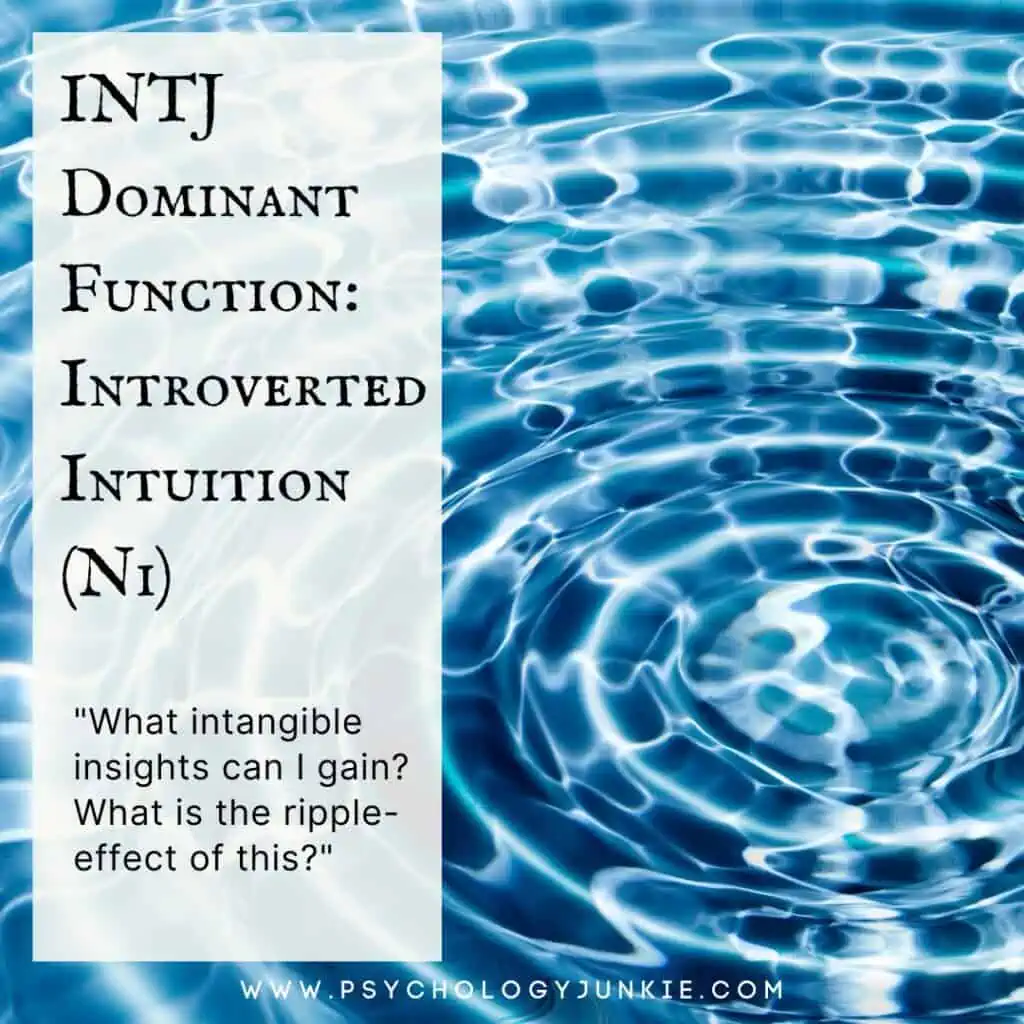
As a Dominant Function, Introverted Intuition (Ni) provides INTJs with the ability to future-prospect and witness present-day reality from a broad perspective. INTJs, perhaps more than any other type, play the long game. Their focus often concerns reaching for Ni’s internal ideal rather than the immediate needs of the moment as Extroverted Sensing (Se) would. Doing something “fun” might bring positive emotions to the surface now, but will that choice produce a beneficial outcome later? Most INTJs are in the ever-constant process of working towards something (a project, a degree, a business, a healthy partnership, building their own character, etc). Living fully in the present doesn’t allow them to speculate or engage with the plethora of visions within their unconscious.
INTJs utilize Ni in a number of ways, however, depth and foresight seem their strong suit. Ni works as an ongoing background process that nudges the INTJ into where to move the chess pieces now in order to acquire an outcome they want later. It’s a fair question to ask how much conscious control Ni Dominants have over their intuitive realm. Ni doesn’t work like a soda machine where a button is pressed and information pools out immediately. Ni insights well up from the unconscious at its own pace, cluing the INTJ into the thematic narratives playing out in their lives as well as the potential ebbing in the reality around them. Ni hosts a daydream quality that functions beyond touch. The speed at which these inclinations come is not definitive. Ni is often equated to seemingly out-of-nowhere “Aha!” moments. However, these realizations are not random given that the function has been processing behind the scenes of experience the entire time. Yet it is only when all of the pieces line up for the INTJ that the “Aha!” pulls all of the necessary information to the surface and grants the Ni Dominant their realization. INTJs come to trust and rely on their deeper mind’s ability to organize their perceptions in the background.
Through strong Ni, INTJs are typically aware of cycles and what’s to be expected across life processes. “There’s nothing new under the sun” might be a fair expression of this. Although, these Ni Dominants seem to value expectations that can be attributed to typical spans of time. Ni grants INTJs a tendency towards archetypes and other thematic narratives that view structure from a wide lens. For example, an admiration for The Hero’s Journey is not uncommon among INTJs. A structured story that shows the progression of an individual’s trek from home, to their adventure, and back again once they have experienced a massive change seems comforting to these types. “Now” is in constant shift and, as such, is not prioritized when held against the future. Emotions, friendships, careers, and so on are only stable until they are not. Endpoints are predictable and necessary for growth and expansion. Recognizing that lifespans hold within them multiple twists and turns grants the INTJ the ability to acknowledge that the journey isn’t over, although a singular chapter may be. Now is not forever. The question thus becomes, how does the INTJ invest in the right things “now” that will equate to a positive future?
Auxiliary Function: Extroverted Thinking (Te)
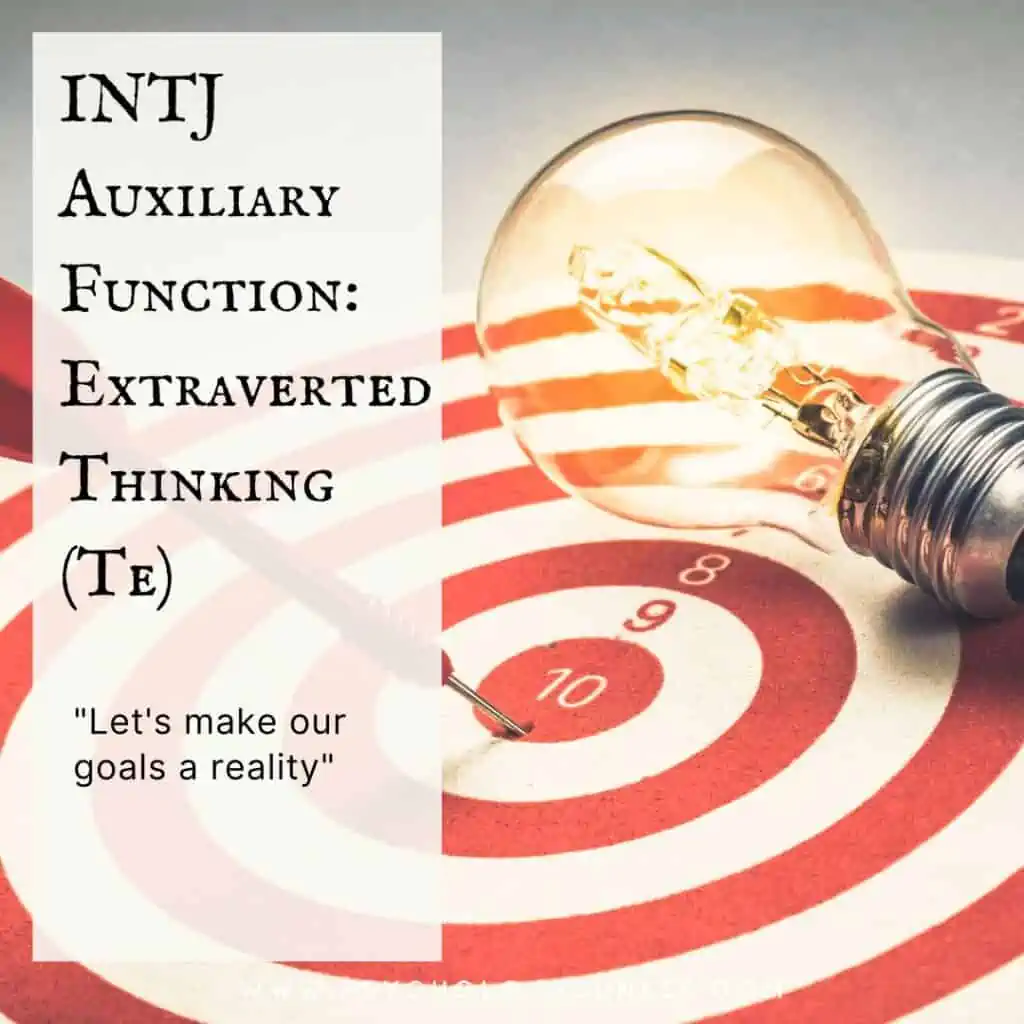
As an Auxiliary Function, Extroverted Thinking (Te) provides INTJs with the ability to accomplish their Dominant Introverted Intuition (Ni) goals through effective work processes and systems. INTJs have the gift of seeing where they want to end up long before any steps forward are made. Auxiliary Te simply tells the INTJ how they can best make that happen. Te prioritizes “what works” in reality. Te generally isn’t interested in philosophizing just to philosophize. Discussion should be useful and purposeful—often in the realm of improving the current state of things. In a way, Te is fairly optimistic. It recognizes there is always the potential for improvement. Te logic states that if something can be done in a better way, it should be. Motivated by Te, INTJs are acutely aware that time is a resource that cannot be replenished and seek to use it well.
When utilized together, well-developed NiTe skillfully actualizes dreams. Dreams, in this case, meaning internal ideals. Ni provides the idealized image of what is to come while Te sorts through actionable steps and selects the most useful ones. Once engaged, a sort of cognitive trail is marked. The INTJ can naturally follow said trail in order to make the “right” moves (the most effective moves with the least energy expended) towards accomplishment.
The level of strategic decision-making necessary for college and career planning illustrates Te’s resourcefulness to INTJs well. It is Te that will help the INTJ find the best route for their independent Ni journey through time:
Perhaps an INTJ teen ultimately sees herself as an engineer (Ni) and wants to plot her best route forward towards that goal. This conscious desire is loaded with steps that trickle from the teenage “now” to the adult engineer vision. In order to become an engineer, the INTJ must first pass her high school classes well enough to be accepted into a university with a solid engineering program. However, Te will look at enrollment statistics and alert the INTJ that the university of her choice may not accept students with high GPAs alone. Universities are competitive and thus the INTJ might need to spruce up her college applications with volunteer hours, part-time employment hours, sports participation, and anything else that will make her look more dedicated so that she can achieve the end result she wants, where she wants. Yet, this is only stage one. Choosing the appropriate professors to study under, course sequences, internships and so on are further decisions that must be made far before entry into a program if a particular result is desired. Te will help the INTJ pick out professors of merit (What are their credentials? How long have they been teaching? Do they have a credible ethos?), which courses are relevant to their type of engineering (Will this course be useful to me? Will discussions become actionable or will they remain endless thought experiments?), which internships will give them necessary skills (Will this teach me transferable skills I can apply to roles elsewhere? Could this lead to other opportunities in the future?), and more. The Ni vision grants the INTJ the aspiration, Te comes in to help get them there.
The Auxiliary Te Function is strong, but the INTJ may have to choose to use it. It’s not uncommon for all types to skip over their secondary function in order to keep within the comforting realm (introverted vs extroverted) of their Dominant Function. An INTJ who does not tap into their Te will likely daydream heavily about meaningful futures derived by their Ni-Fi combination, but will never take the actionable steps towards it, which Te so naturally grants. It’s important for INTJs to utilize their ability to measure their time, abilities, skills, and options so that they do not remain trapped in a mirage they cannot tangibly reach.
Tertiary Function: Introverted Feeling (Fi)

As a Tertiary Function, Introverted Feeling (Fi) provides the INTJ with the ability to assess their own values and feelings. Fi ultimately serves the INTJ’s Dominant Introverted Intuition (Ni) through directing goals and ambitions towards achievements with personal significance. Once Fi and Ni are in alignment, Extroverted Thinking (Te) can plot the most effective route towards a meaningful endeavor.
Fi leads INTJs towards a path of self-discovery. The subjectivity of inner feeling grants its user an awareness of tastes and preferences that set them apart from everyone else. INTJs may have strong political affiliations or firm stances on concepts ranging from veganism to altruism. What proves important to the INTJ’s sense of self (Fi) is typically pursed logistically (Te).
INTJs do not equate enthusiastic feeling with strength of feeling, which may cause some discomfort around high Extroverted Feeling (Fe) users. For the INTJ, deep sentiment comes from an inner place. Emotional attachment is not an external show for the other person so much as place to hold an internal sense of moral rectitude and integrity towards another human being. Speaking the feeling may not do the feeling justice.
The Tertiary Function is personally noticeable in all types, but in this case does not carry the strength of the INTJ’s Dominant Ni or Auxiliary Te. While Tertiary Fi grants INTJs the ability assess whether individuals carry genuine intent, their reading of a situation will be more black and white than FP types who allow a wider range of the emotional spectrum to guide actions. Some INTJs may also be put off those who externalize emotion only to cause a scene or entice another person towards a particular action.
Enthusiasm alone runs counter to their value of personal alignment.
Inferior Function: Extroverted Sensing (Se)
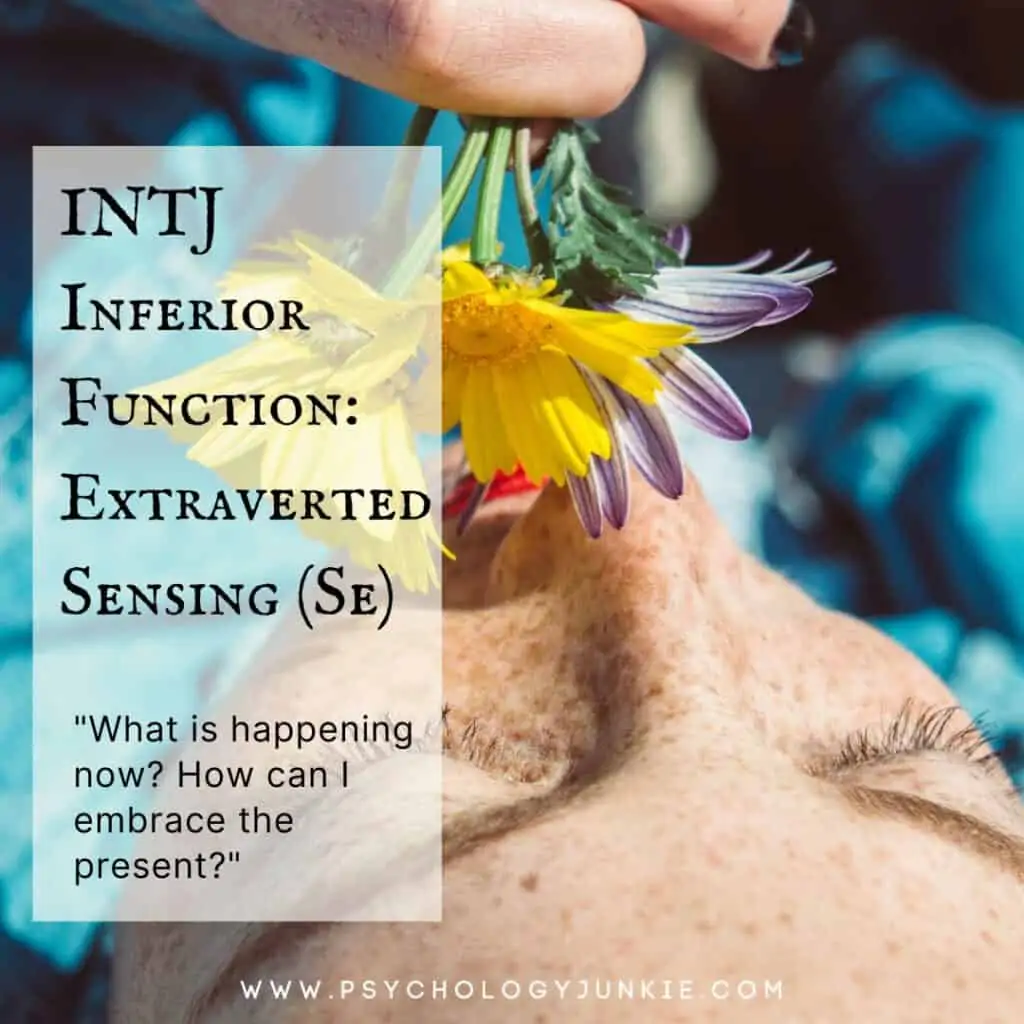
As an Inferior Function, Extroverted Sensing (Se) provides the INTJ with the ability to witness objective reality and their own physical presence. INTJs will have limited awareness of this as most of their energy will be naturally directed towards their Dominant Introverted Intuition (Ni). The Inferior Function is known to trip up its user in unique ways.
Dominant Se users (ESTPs and ESFPs) are skilled at being present, although they often struggle to see the positive or negative long-term consequences of their moment-by-moment choices. INTJs have the opposite problem. INTJs can be so focused on the ultimate outcome of a particular endeavor that they never partake in the pleasure of now. Or, when they do, it’s an excessive form of experiencing that might include some form of dopamine-seeking or adrenaline-seeking behavior that lacks concern for their personal safety.
Carl Jung calls Se types “the ultimate realists.” Ni types, however, naturally focus on symbols and meaning. In a case of extreme preference for their Dominant Function, INTJs may find themselves removed from reality to the extent they do not feel “at home” in their bodies or in their environment. INTJs may focus so heavily on the thematic structuring of their experience that they never actually live. INTJs may also prove sensitive to sensory stimulus.
Se serves Dominant Ni by witnessing reality as it is without, releasing INTJs who might otherwise find themselves stuck in dreamland. Se can help make Ni more actionable by showcasing what is actually possible given the present state of things. It would be impossible to return to college if there’s no tangible way to acquire the funds to go. Se acts as a “rooting” affect for Ni contemplations so that the inner intuitive realm can be disciplined in order to function within society. INTJs can utilize their Se to help them towards better future. It takes a realistic assessment of where the INTJ is “now” in order for Auxiliary Extroverted Thinking (Te) to route the best method towards the INTJ’s personal (Fi) goals and visions (Ni).
Opposing Role Function: Extroverted Intuition (Ne)
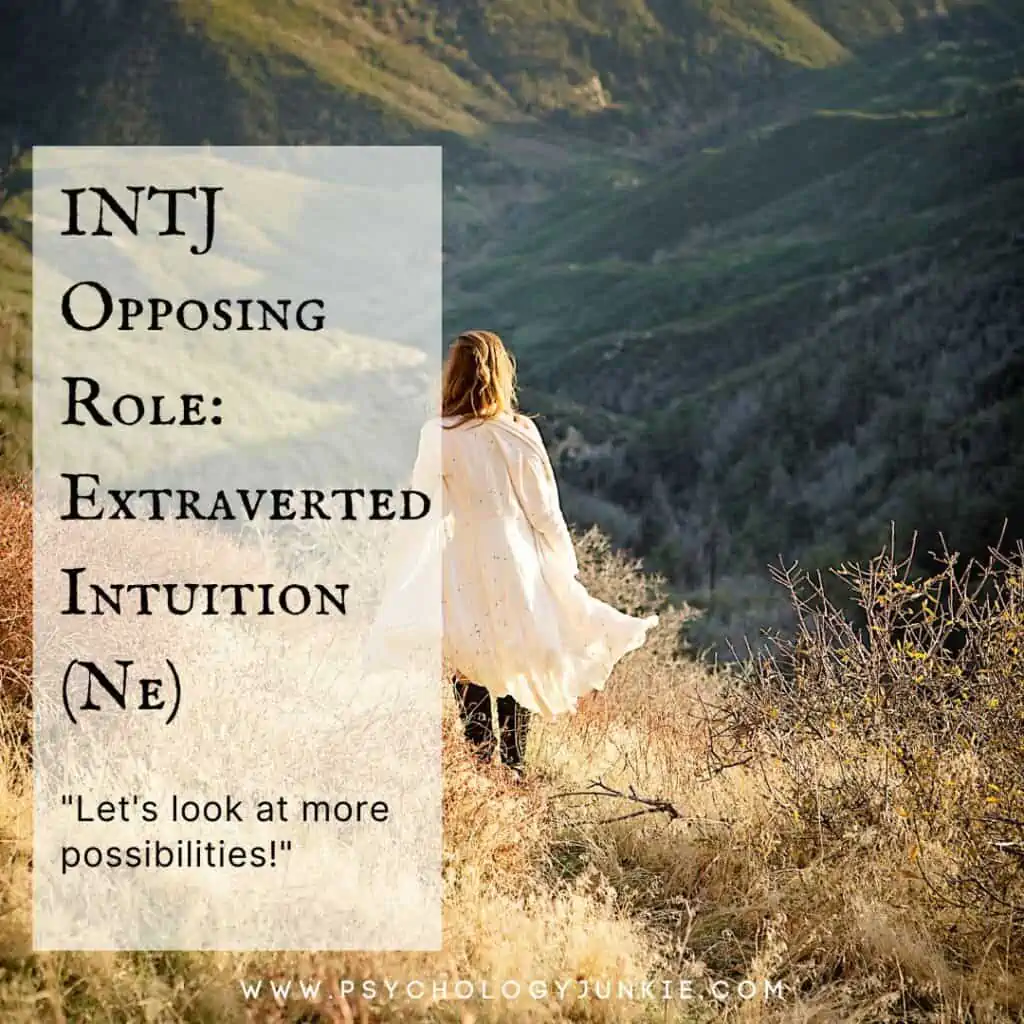
As the Opposing Role Function, Extroverted Intuition (Ne) reminds INTJs that their Dominant Introverted Intuition (Ni) may be limited in scope, which could result in their missing crucial information for the development of their visions. Ne generally produces limitless possibilities and potential outcomes. Ne is open-minded and adaptable. NP types with strong Ne use tend to change their minds as more information as gathered. However, NJ types with strong Ni user are typically settled in their conclusions.
The Opposing Role Function “checks and balances” the Dominant Function. Ni is not built to take into consideration multiple possibilities, nor is it inclined towards breadth. INTJs utilize Ni to know the right way to move and are generally settled in their standpoint. Thus Ne, which generates multiple ways to view things, may prove distracting to INTJs. Or, perhaps even annoying—much like a wasp that refuses to leave.
However, Shadow Functions can be utilized for growth rather than discontent. The Dominant Function and the Opposing Role Function seem to showcase what “iron sharpens iron” means. If an INTJ can patiently consider what diverse possibilities Ne conjures, it may prove to further strengthen and refine the INTJ’s own stances and future-projections. If Ne brainstorming finds “holes” in the INTJ’s vision, it’s to the INTJ’s betterment. Bringing to light weak areas that Ni hasn’t picked up on will provided a clearer view of the reality of their approach. When considering potential career fields, it might be helpful to know that multiple tracks are available for a given destination.
Critical Parent Function: Introverted Thinking (Ti)
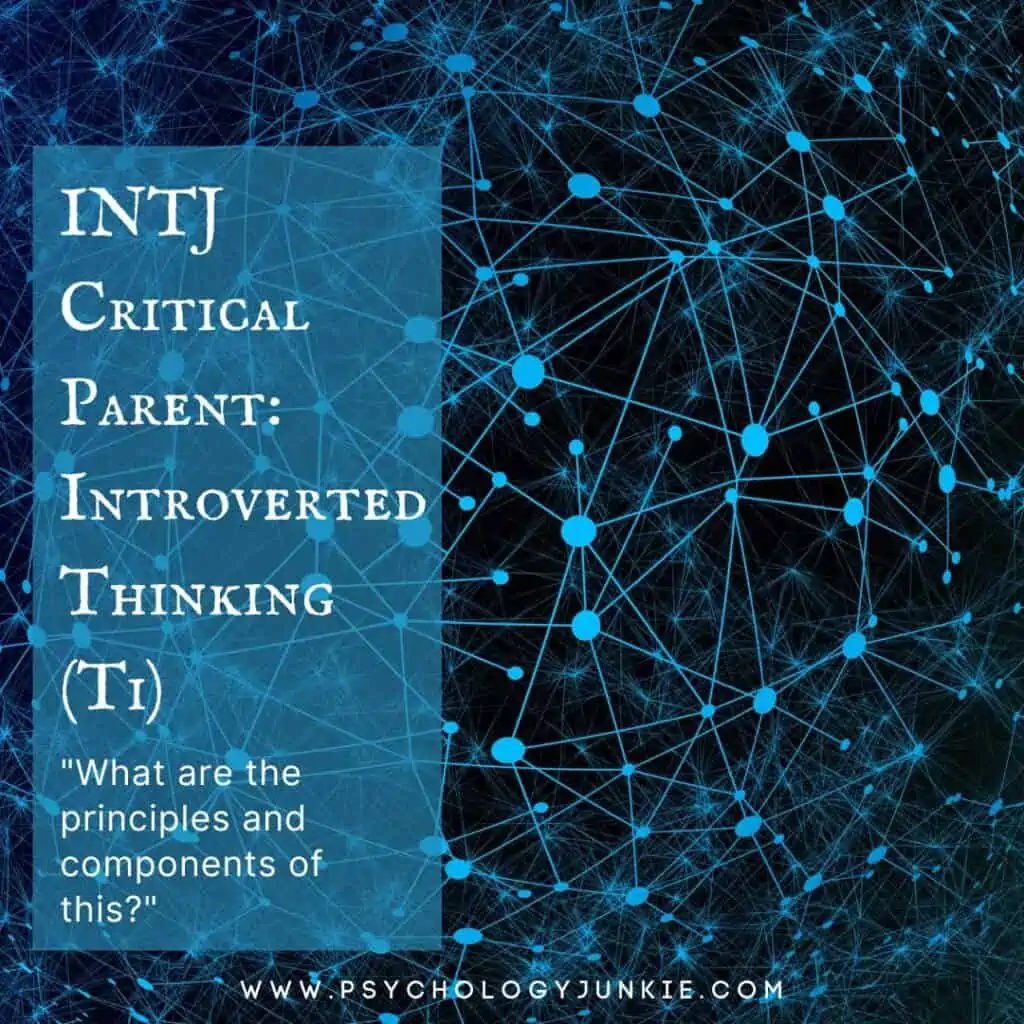
As a Critical Parent Function, Introverted Thinking (Ti) reminds the INTJ to consider the fundamental properties of the information they consume and distribute rather than focus on its usefulness (Te). Ti cares about creating a solid framework to build upon. Ti does not focus on the applicability of an idea as Te often does, but its underlying principles.
INTJs can feel dysregulated by Ti because in the Critical Parent role Ti can host a chiding tone. Do you have ample reason to trust the information you’re getting? What proof do you have that these statistics weren’t taken from a particular angle? Couldn’t this credentialed author have a particular agenda behind they’re pushing despite all of their education? If you break your argument down to component points, what you’re actually saying isn’t accurate. INTJs ultimately want to reach their meaningful visions in the most efficient way possible, which necessitates tangible results and efficiency. Ti can seem like a nuisance to enacting their goals and visions.
However, if an INTJ reframes Ti’s will towards accuracy as something helpful rather than smothering, Ti wisdom could assist the INTJ in reaching their goals more quickly. Ti does ask the individual to truly analyze their reasoning to its core components. If the INTJ follows along and finds that information they had been trusting all along to reach their Ni endpoint was not built upon a solid framework, they can redirect sooner than had they continued on their misaligned course.
Considering a diet plan might prove a helpful example. Building a sustainable, healthy diet long-term means doing research and adjusting different food allotments based on how each person’s individual body reacts to the food (there might be thousands of studies that say peanuts are a great source of protein, but if someone is allergic to peanuts, that person cannot consider peanuts a reasonable option, regardless of how healthy they are). INTJs are great at this aspect of experimenting and adjusting based on tangible feedback. However, if there is a fundamental flaw in the diet plan itself that underlies the objective “this works!” Te argument for doing it—much like the peanut example, but at a core level that unravels the usefulness of the diet plan at large—then Ti will find it. Perhaps the diet will work well for ten years before your liver ultimately shuts down based on how the components flow together. A little Ti might prove lifesaving.
Trickster Function: Extroverted Feeling (Fe)
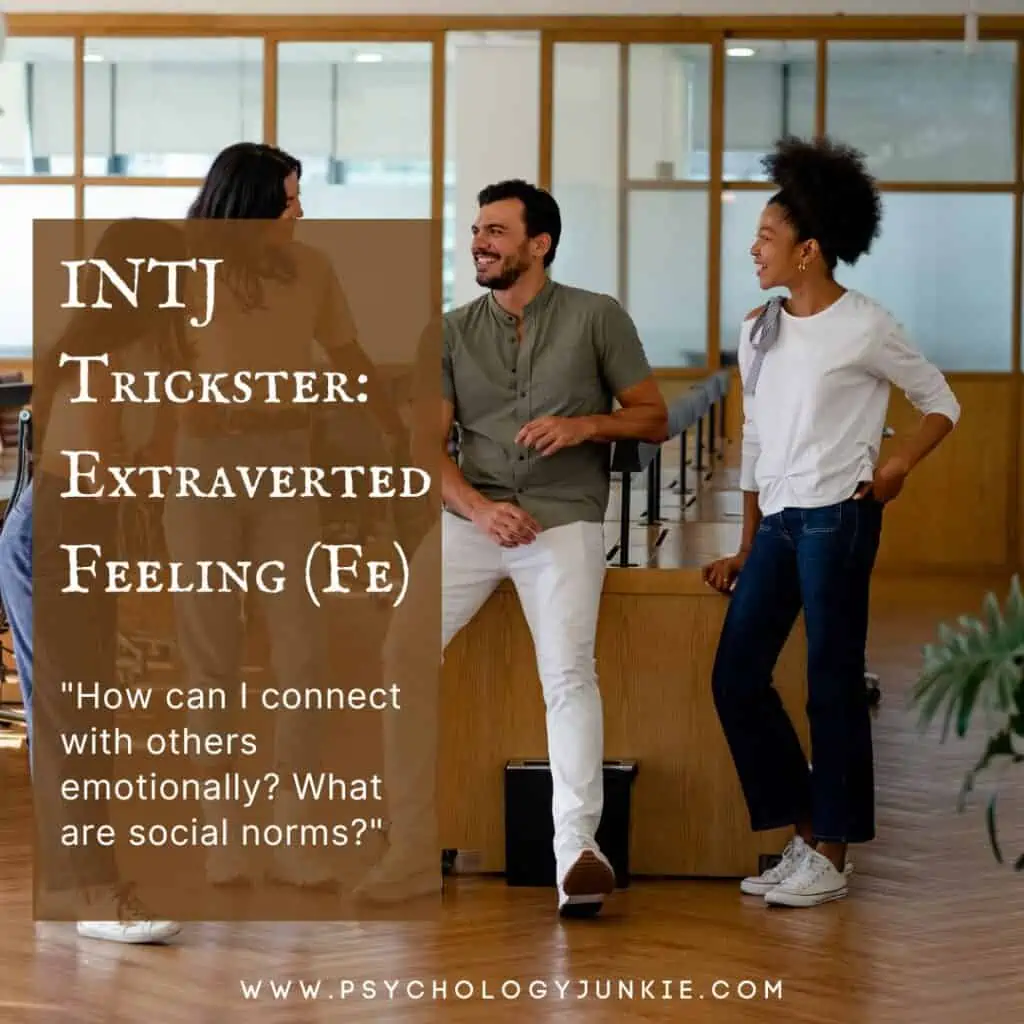
As a Trickster Function, Extroverted Feeling (Fe) reminds the INTJ that their presence does affect the mood of the room, regardless of whether they’re trying to build harmony or not. Typically, INTJs focus in on their desired outcomes (Ni-Fi) and how they can best meet these ideations in a tangible way (Te-Se). Considering the emotional needs of the group isn’t a natural mode for INTJs to go about their day. An INTJ’s Auxiliary Extroverted Thinking (Te) does care about witnessing others achieve effective results for themselves, but the INTJ does not care about speaking tactfully just so others feel good. It’s unlikely that INTJs notice how their general presence in a group affects the group as a whole, but others will respond to the INTJs energy anyway and accordingly.
Fe Dominant types (ESFJs and ENFJs) utilize Fe in order to enforce social standards and create a shared emotional experience. Philosophically, Fe would endorse platitudes that privilege community members sharing and giving to one another. “Help your neighbor” or “love your family” reflect the sort of collectivist expectations Fe holds for individuals. INTJs, however, may view such cutesy sayings as inauthentic. The Trickster Fe targets the INTJ’s Tertiary Introverted Feeling (Fi) ideal of genuine, individualized feeling.
It’s not uncommon for INTJs to critique FJ types as “highly capable of being taken advantage of.” Given that INTJs process their metrics through Te, they tend to evaluate the usefulness of a particular tool with ease. This Te skill, paired with the intention-reading capability of Fi, also clues INTJs in on how people use each other to their own ends, which FJs can be oblivious to in the name of their “do unto others” Fe mantra.
INTJs may find it difficult to avoid Fe as it, much like Te, is a critical component of the set standards humans hold for each other. INTJ will never desire to build a strong Fe lens, but they can try to build an appreciation to the benefits Fe brings. As mentioned, INTJs do bring an energy to the room. People notice each other whether or not they speak loudly, refrain from speaking, refuse to emote, or emote loudly. Each person acts as a component that adjusts the overall situation of the conversations an INTJ will find themselves in. While an INTJ may not want to participate in boisterousness for Fi reasons, they can witness the system of people checking and balancing each other with Fe and utilize their findings to increase their own understanding of how to approach others for the best results.
It might be helpful to consider that it’s possible for Fe and Te to have the same goals, although these functions may go about the same result using a different method. An FJ teacher may use positive reinforcement via kind words in order to encourage students to complete their work on time. Just the right dash of warmth will be added to boost morale. An INTJ will not use the same method as their FJ counterpart to get students working. An INTJ might try tactics that include showing clear examples, setting clear goals, or using a personal privilege like the ability for students to use their phones at the end of class if they finish on time to encourage students to meet expectations. Both teachers in this scenario want the same thing—the students to finish their tasks—but their method to get them there is simply different. INTJs might find some appreciation for Fe in this regard.
Daemon Function: Introverted Sensing (Si)
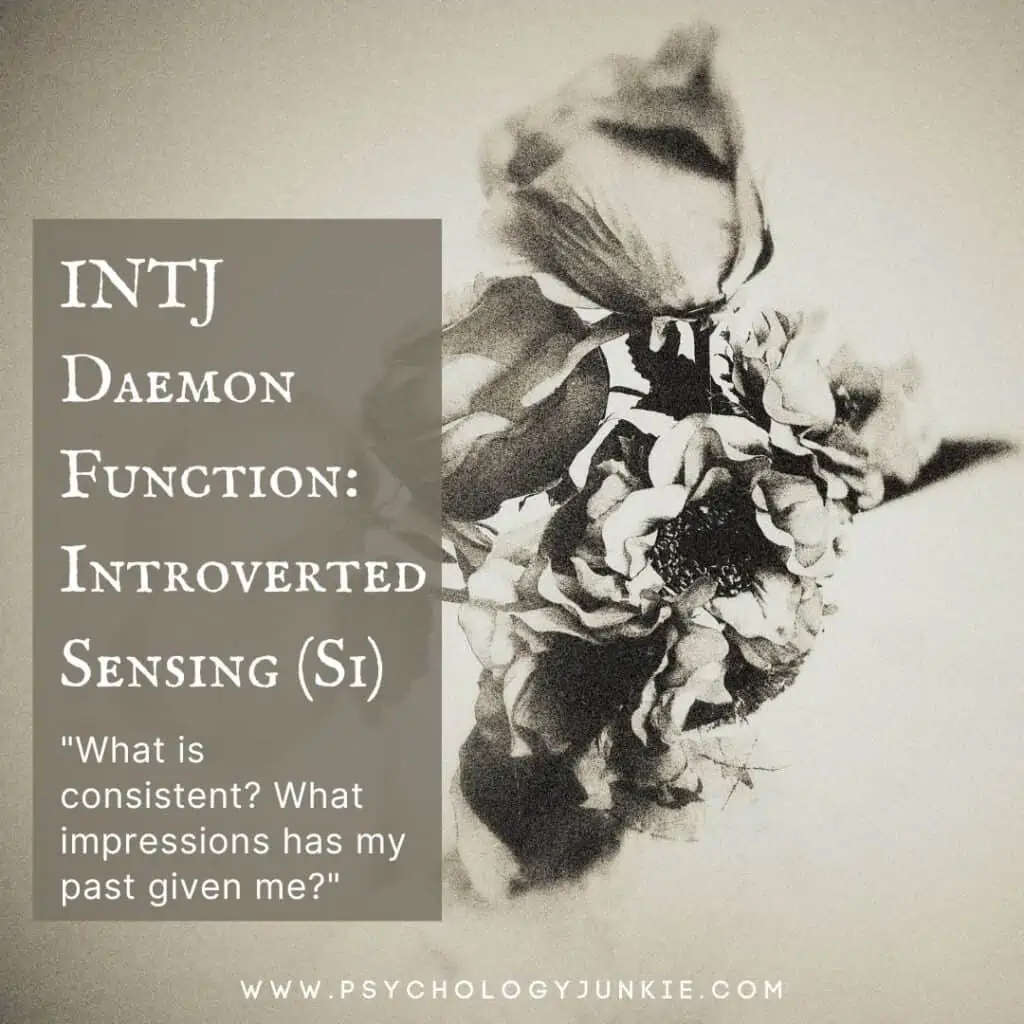
As a Daemon Function, Introverted Sensing (Si) reminds the INTJ to pause their Dominant Introverted Intuition (Ni) projections in order to focus on their inner body sense and the trail of moments they have experienced from their past. Easier said than done as INTJs do not function comfortably in this space. The Daemon Function calls out from the depths to redirect one’s life in a major way. The Daemon Function is often the “reset” button.
INTJs often feel quite removed from their bodies and have a strong preference for the contemplations that keep them honed-in on their deep connection with unconscious Ni material. INTJs do, however, seem more able than INFJs to recognize when they need to eat and sleep—perhaps due to their Auxiliary Extroverted Thinking (Te) which puts them on a schedule because Te acknowledges that bodies are systems that need to be maintained, as all systems do. Even so, INTJ have a weak awareness of their internal bodily sensations. They may not notice their hunger until hours later (perhaps they learn this and set timers to eat) or their developing sickness until it’s beyond the scope of at-home treatment. Ne Dominants (ENTP and ENFP) and Ni Dominants have similar constraints and issues in this regard.
In scope, Si focuses on the microscopic while Ni encompasses the whole of consciousness. Whereas Si Dominants (ISTJs and ISFJs) will focus in on individual elements of a painting (a lush tree, a touch of purple in a flow), an Ni dominant will contextualize the painting within art as a whole (realist, abstract, expressionist, etc). What specifically differentiates an INTJ from an ISTJ is that division between expansive inner knowing (Ni) and the methodical ordering of one’s detail-oriented past (Si). Clearly, for an INTJ to shift into Si mode, their entire way of being would have to completely alter itself. Remaining in Si land is not sustainable for the INTJ.
Due to an INTJ’s lack of Si awareness, they may be quite disconnected from their past. However, if the Daemon Function is engaged they may suddenly determine they were a failure. There’s a psychological concept called Counterfactual Thinking which explains that humans tend to imagine alternative futures that could have occurred had they simply made different in-the-moment choices way back when. This form of thinking looks something like: “If things only I would have chosen this instead of that, then I would have this other life instead.” The concept is labeled “counterfactual” because this sort of thinking is “against the facts.” What occurred has already occurred and there is no going back. For an INTJ who had a strong inner image they followed for years and yet never obtained, Counterfactual Thinking may occur as the direct result of their unlived idealized vision. The INTJ may be caught up in moves they could have made if only they would have known better then.
The gift of reassessing the past—which INTJ often don’t engage in because they are so focused on the future—is learning how to apply old situations to new ones in order to gamify them more quickly. While under the thumb of Daemon Si it may prove beneficial to take the lessons learned and put them in their cognitive tool kit rather than to sit and fester in their crumbling vision. Imagination is endless, after all. One vision falls so another may rise.
Other Articles You Might Enjoy:
24 Signs That You’re an INTJ, the Strategist Personality Type
10 Things You Should Never Say to an INTJ
When INTJs Loop – Understanding the Ni-Fi Loop
What Are Your Thoughts?
Did this article help you better understand your personality type? Do you have any insights or revelations that have come to you from reading this? Let us and other readers know in the comments!
Find out more about your personality type in our eBooks, Discovering You: Unlocking the Power of Personality Type, The INFJ – Understanding the Mystic, The INTJ – Understanding the Strategist, and The INFP – Understanding the Dreamer.
About the Author:


Subscribe to Our Newsletter

Want to discover more about personality type? Get the inside scoop with Susan Storm on all things typological, along with special subscriber freebies, and discounts on new eBooks and courses! Join our newsletter today!










